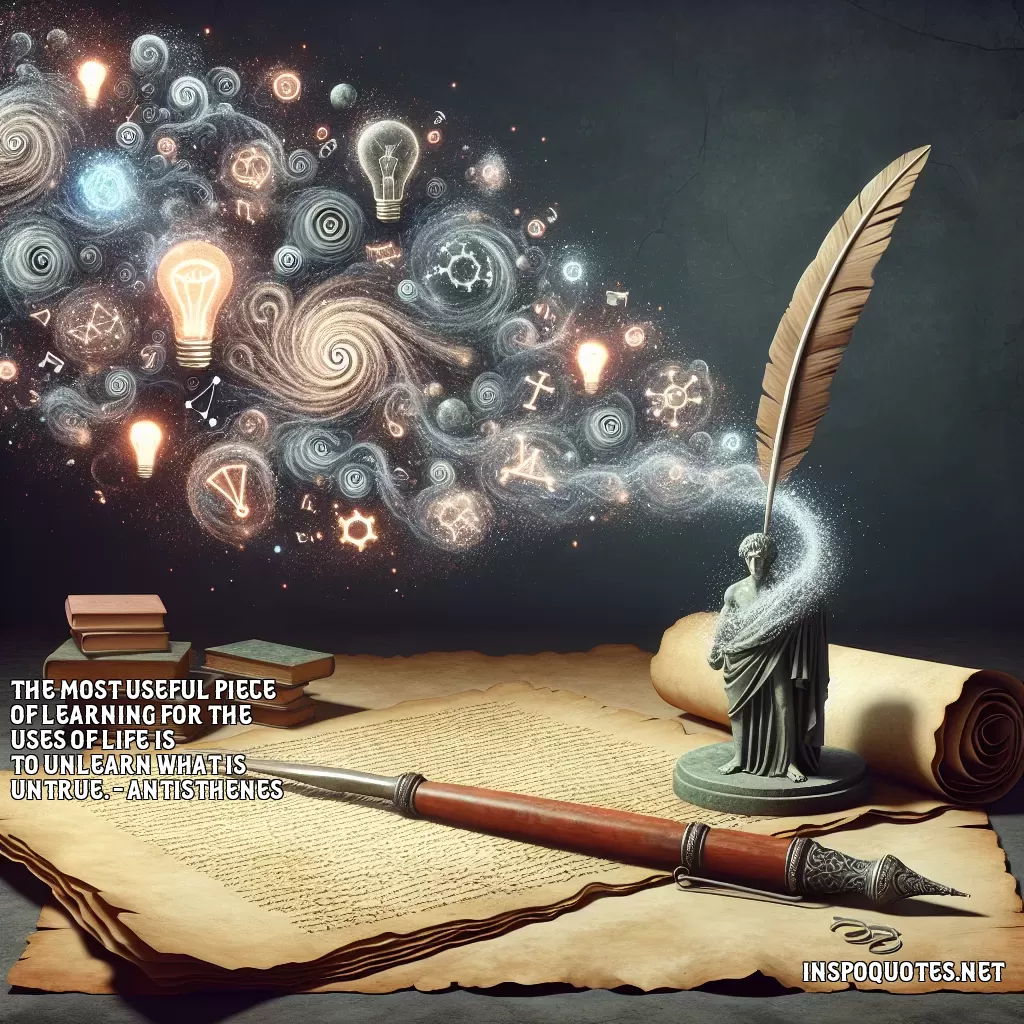
The most useful piece of learning for the uses of life is to unlearn what is untrue. - Antisthenes
Author: Antisthenes
👁️ 14 views

The most useful piece of learning for the uses of life is to unlearn what is untrue. - Antisthenes
👁️ 14 views
Antisthenes, a philosopher from ancient Greece and a pupil of Socrates, is credited with the quote, "The most useful piece of learning for the uses of life is to unlearn what is untrue." This statement encapsulates a profound philosophical insight: that personal growth and the pursuit of truth often require a process of unlearning. Unlearning involves critically examining and shedding false beliefs and misconceptions that we have acquired over time. This process is essential because our beliefs shape our perceptions, decisions, and actions. Holding onto falsehoods can lead us astray, creating barriers to understanding and wisdom. In essence, unlearning serves as a foundational step in the journey toward enlightenment and self-improvement. Moreover, Antisthenes emphasizes the practical value of unlearning. In life, possessing accurate knowledge and understanding is more beneficial than merely accumulating information or skills. By clearing our minds of what is untrue, we make space for genuine insights and truths that can guide us more effectively. This approach can lead to more profound clarity, better decision-making, and improved relationships, as we are less constrained by biases and misconceptions. In modern terms, unlearning might involve questioning societal norms, personal prejudices, or even outdated educational concepts. It requires humility, open-mindedness, and a willingness to change. Ultimately, Antisthenes' quote encourages continuous reflection and growth, helping us align more closely with reality and live more meaningful lives.
Quote By: Antisthenes
Antisthenes (c. 445–365 BCE) was a prominent ancient Greek philosopher, best known as a foundational figure in the development of Cynicism. Born in Athens and believed to be a student of Socrates, Antisthenes interpreted and expanded upon his teacher's teachings, focusing particularly on the themes of virtue, self-discipline, and the rejection of material excess. While little of his writing survives today, Antisthenes left a profound impact on Western philosophy, influencing later thinkers, including Diogenes of Sinope, who is often celebrated as the archetypal Cynic.
Antisthenes embraced a doctrine that emphasized the importance of living a life in accordance with nature and championed the idea that virtue is the sole good. He argued that happiness and contentment could be achieved through self-control, simplicity, and the pursuit of wisdom rather than through the accumulation of wealth or social status. His most famous work, "Cyropaedia," although often attributed to Xenophon, includes ideas central to Antisthenes’ philosophy. He also wrote numerous other works that critiqued societal norms and emphasized ethical living.
In his teachings, Antisthenes strongly opposed the values of contemporary Athenian society, which he viewed as overly focused on materialism and superficial happiness. He advocated for a lifestyle characterized by asceticism and independence. His austere philosophy encouraged individuals to rely on themselves and their reasoning rather than external opinions or material possessions. Antisthenes famously stated that "he who is not a slave to his desires is truly free," encapsulating his belief in freedom through self-mastery.
Antisthenes' legacy can be seen in the later works of various philosophers, especially in the Stoic tradition which drew heavily from Cynic principles. His emphasis on virtue and ethics invited critical examination of the human condition, making him a pivotal figure in the evolution of philosophical thought in ancient Greece. Today, Antisthenes is remembered not only as a teacher of Diogenes but also as a visionary who laid essential groundwork for both Cynicism and Stoicism. Through his teachings, Antisthenes continues to provoke discussion regarding the nature of happiness, virtue, and the human experience.